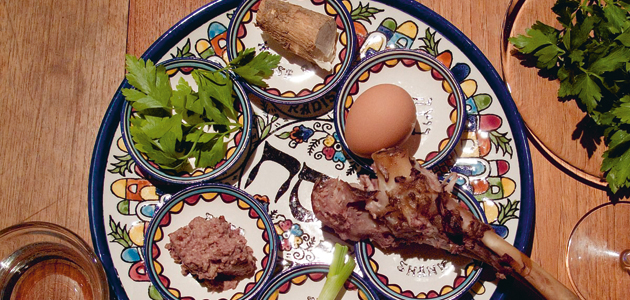Bread and the bone: Anthony Gimpel’s Thought for the week
‘There is colour, light and song, taste and smell.’

Back in April at Loughborough Meeting, we held a Passover Seder and shared lunch. The Passover meal is based on the story told in Exodus, of how the Hebrews escaped slavery. It’s hard to tell whether there is any factual basis for this tale, but its re-enactment in the Passover meal is full of meaning.
The ritual meal is a combination of two, perhaps three stories. Firstly, it is a celebration of spring, and is always celebrated at the full moon of the Jewish month Adar. Easter is also celebrated in the spring, but the Christian and Jewish calculations don’t match. This year they coincided quite neatly. The second story remembers that the Hebrews were told to roast a lamb for each family, and to eat it standing up. The third story is similar: in order to be ready to flee at a moment’s notice, they were told they must not waste time waiting for the dough to rise before baking their bread; they should eat it unleavened. The last supper eaten by Jesus and his disciples was a Passover. It says so explicitly in Mark’s gospel.
The fact is, we human beings love ritual and tradition, and, for all our professed simplicity, we Quakers are the same. Like all traditions they grow; what we did last year is now a tradition. Now, with the emphasis on being vegetarian, the roasted lamb is relegated to a single bone, and sometimes not even that remnant. The unleavened bread carries on. Matzos is just flour and water, mixed, rolled out, and baked in a hot oven, all within eighteen minutes, to make sure it doesn’t start to ferment.
The Passover is a time to remember the Exodus. It’s a wonderful occasion for young and old, for all our senses: dipping bitter herbs, usually parsley, into salty water to remind us of the tears we have shed; tasting horseradish, another bitter herb – the children get a tiny dot on the tip of a finger. And then combining it with Charoset, a lovely sweet mixture of apples in red wine (or, in Quaker circles, grape juice) and several other sweet ingredients, to represent the mortar needed to build the pyramids. There is colour, light and song, taste and smell.
But the ceremony is much more than a remembrance. It is a reminder that we must continually stand up for our freedom, and for the freedom of all people. The unleavened bread is called the bread of affliction. All of us live with tyranny. In one part of the meal we remember the ten plagues that God visited on the pharoah. We substituted the frogs and lice with things that plague us today, like politicians and fake news and social media, spilling drops of red grape juice on the tablecloth for each one with a loud ‘Yuk!’.
The second central commandment of both Judaism and Christianity is that we love our neighbours as ourselves. As we demand freedom for the oppressed and the enslaved, for the refugees and asylum seekers, we remind ourselves that we too need freedom; we ourselves have all come from somewhere.
You need to login to read subscriber-only content and/or comment on articles.
